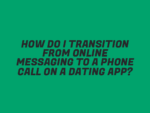How Can You Spot a Catfish on a Dating App?
Online dating has transformed the way people meet, offering more opportunities to connect with potential partners than ever before. However, it also comes with risks, including the possibility of encountering a “catfish”—someone who creates a fake identity to deceive others. Catfishers often use dating apps to manipulate emotions, gain financial benefits, or create fake relationships for their own purposes. Being able to spot a catfish early on can help protect you from emotional distress and potential scams. This guide will dive into the top 10 most common questions about spotting a catfish, offering detailed insights and expert advice on how to identify and avoid these deceptive individuals.
What Are the Signs of a Fake Profile on a Dating App?
Identifying a fake profile is the first step in spotting a catfish. While many dating profiles look legitimate, there are often subtle red flags that can alert you to someone who isn’t being honest.
Common Signs of a Fake Profile:
- Too-good-to-be-true photos: One of the biggest giveaways of a fake profile is the use of exceptionally attractive, model-like photos. While many people use flattering images, photos that appear too polished or professional may be stock images or stolen from someone else’s social media.
- Lack of personal details: Genuine profiles usually include information about a person’s hobbies, job, or life goals. A fake profile might only have a few vague lines about who they are, often without specifics or relatable content. Phrases like “I’m just looking for love” or “Ask me anything” can be too generic and a sign of deception.
- Limited photos: Catfishers often use only one or two photos, and they rarely include a variety of images that show their daily life or personal interests. A genuine user will typically have more than one photo in different settings.
- Inconsistencies in information: Pay close attention to inconsistencies between their profile and what they say during conversations. For example, if they claim to be a teacher but later say they travel constantly for work, this discrepancy could signal a fake profile.
- Avoidance of personal questions: A real connection involves sharing personal details and opening up about your life. If someone is unusually secretive or avoids answering simple questions about themselves, it’s possible they’re hiding something.
These signs can help you recognize a fake profile early and prevent you from becoming emotionally invested in someone who isn’t who they claim to be.
Why Do Catfish Avoid Video Calls?
One of the clearest signs of a catfish is their reluctance or refusal to engage in a video call. Video chatting is a standard practice in modern online dating, so when someone repeatedly avoids it, you should consider it a red flag.
Reasons Catfish Avoid Video Calls:
- Mismatch with profile photos: The most common reason catfishers avoid video calls is that they don’t look like the person in their profile pictures. They’ve stolen someone else’s images and can’t risk being seen as their real selves, which would instantly expose their deception.
- Technical excuses: Catfishers frequently use excuses like “My camera is broken,” “I don’t have good Wi-Fi,” or “I’m in a location with bad internet” to avoid video calls. While these may seem believable at first, repeated use of such excuses is a major red flag.
- Delaying tactics: Catfish often try to delay a video call by promising to do it “later” or “sometime soon,” but they continually find reasons to postpone it. Their goal is to keep you engaged and prevent you from getting suspicious while they continue their deception.
- Fear of exposure: Ultimately, catfishers know that a video call would immediately expose them. They avoid video chats at all costs to maintain the illusion they’ve created and keep you from seeing their true identity.
If someone repeatedly refuses video calls after multiple attempts, it’s a sign that they may not be who they say they are. A genuine person should have no problem engaging in a video chat if they’re serious about building a connection.
What Are the Red Flags in Communication with a Catfish?
The way someone communicates can reveal whether or not they’re being genuine. Catfish often rely on certain communication strategies to manipulate and maintain control over their targets, and recognizing these patterns is key to spotting a scam.
Red Flags to Watch for in Communication:
- Over-the-top compliments or affection: One of the most common tactics used by catfishers is excessive flattery. They may shower you with compliments or express strong feelings very early in the conversation, even before they know you well. This is known as “love bombing” and is designed to make you feel special and lower your defenses.
- Avoidance of personal questions: A real conversation involves back-and-forth sharing. If the person you’re talking to avoids answering personal questions or gives evasive responses, it could be a sign they’re hiding something.
- Inconsistent language or grammar: Catfishers often operate from different countries, and their language might not match their supposed identity. For example, if they claim to be from the U.S. but frequently make unusual grammatical errors or use expressions that don’t fit their location, this could indicate they’re lying about their background.
- Pressure to move quickly: Catfish often try to move the relationship forward at an unnaturally fast pace, pushing for serious commitment or deep emotional connection before it’s warranted. They may claim they’ve “never felt this way before” or want to meet in person after only a few conversations.
- Emotional manipulation: Catfishers are skilled at manipulating emotions, often playing the victim to gain your sympathy. They might tell elaborate stories about personal tragedies, such as the loss of a loved one or a difficult upbringing, to tug at your heartstrings and make you feel more connected to them.
Recognizing these communication red flags can help you avoid falling into a catfish’s trap. Trust your instincts—if something feels off, it probably is.
Why Do Catfish Often Ask for Money?
One of the most common goals of catfishers is financial gain. They build trust with their victims over time, creating a believable narrative before asking for money under the guise of an emergency or hardship.
Common Tactics Used to Ask for Money:
- Personal emergencies: Catfishers often create sob stories about sudden financial crises. They might claim they need money for medical bills, travel expenses, or to help a family member. These emotional pleas are designed to make you feel guilty for not helping.
- Promises of repayment: To make their requests seem more legitimate, catfishers may promise to pay you back as soon as their situation improves. They may claim that they’re temporarily stuck and just need a short-term loan, but this is almost always a lie.
- Urgent needs: Catfishers often create a sense of urgency to pressure you into sending money quickly. They might say they’re stranded abroad, can’t access their bank account, or need money to deal with a sudden emergency. This urgency is designed to prevent you from thinking too much before acting.
- Requests for untraceable payment methods: Instead of asking for a direct transfer, catfishers often request money through untraceable methods like gift cards or wire transfers (e.g., Western Union). These methods are difficult to reverse, and once the money is sent, it’s almost impossible to get it back.
If someone you’ve never met in person asks for money, no matter how compelling their story seems, it’s a major red flag. Never send money to anyone you’ve only interacted with online.
How Can You Verify If Someone Is Who They Claim to Be?
Before meeting someone in person or getting too emotionally involved, it’s important to verify that they are who they claim to be. There are several steps you can take to confirm someone’s identity.
Ways to Verify Their Identity:
- Reverse image search: One of the easiest ways to verify if someone’s photos are real is by using a reverse image search tool like Google Images or TinEye. This tool allows you to upload or search for their photo online to see if it has been used elsewhere, which could indicate that the images are stolen from another person’s social media profile.
- Ask for a video call: Requesting a video chat is one of the most reliable ways to verify someone’s identity. A genuine person will have no issue hopping on a video call, while a catfish will avoid it or come up with excuses.
- Check their social media: Most people have social media profiles that provide additional context about their life. Ask if they have an Instagram, Facebook, or LinkedIn account. If they refuse to share or claim they don’t use social media at all, this could be a warning sign.
- Ask for a real-time photo: If they’re reluctant to video chat, you can request a real-time photo. Ask them to send a selfie while holding something specific, such as today’s newspaper or a particular hand gesture. If they delay or refuse to send it, it may indicate they’re hiding their true identity.
By taking these steps, you can significantly reduce the risk of being deceived by a catfish and ensure that the person you’re talking to is legitimate.
Why Do Catfish Often Claim to Be “Out of the Country”?
One common tactic used by catfishers is claiming to be out of the country. This excuse allows them to avoid meeting in person and makes it easier to create a narrative that prevents you from verifying their identity.
Reasons for the “Out of the Country” Excuse:
- Avoiding face-to-face meetings: A catfish can’t meet you in person because they’re not who they claim to be. Saying they’re in another country provides a convenient excuse for why they can’t arrange an in-person date.
- Building trust through distance: By claiming to be out of the country, a catfish can foster a long-distance connection that gives them more time to build emotional trust and manipulate you before asking for money or other favors.
- Setting up financial scams: This excuse often sets the stage for future financial scams. The catfish might later claim they need money to return home, have had their wallet stolen while abroad, or can’t access their bank account in a foreign country. These stories are designed to create urgency and play on your sympathy.
- Justifying erratic communication: Claiming to be out of the country gives catfishers a reason to have poor or inconsistent communication. They might use the excuse of different time zones, bad internet, or busy work schedules to avoid video chats or timely replies.
If someone you’ve met online claims to be living or working abroad, especially for an extended period, be cautious. This is a classic catfishing tactic used to avoid scrutiny and personal interaction.
What Should You Do If You Suspect Someone Is a Catfish?
If you suspect that someone you’ve been talking to on a dating app might be a catfish, it’s important to act quickly to protect yourself from further harm.
Steps to Take If You Suspect a Catfish:
- Stop communication immediately: If something doesn’t feel right and you suspect the person is a catfish, cut off communication. Continuing the conversation can allow the catfish to manipulate your emotions further.
- Report their profile: Most dating apps have a feature that allows users to report suspicious activity or profiles. Reporting the profile helps protect others who might be targeted by the same scammer.
- Block the person: After reporting the profile, block the person to prevent further contact. Blocking ensures that they can’t continue to send messages or try to manipulate you.
- Trust your instincts: If you feel uncomfortable or notice any red flags, trust your gut. It’s better to be cautious and remove yourself from a potentially harmful situation than to ignore the warning signs.
Taking these steps can help protect you from emotional harm and prevent the catfish from targeting others.
How Can You Protect Yourself from Catfish Scams?
Protecting yourself from catfish requires vigilance, awareness, and an understanding of common online dating scams. There are several practical steps you can take to safeguard yourself from these types of fraud.
Tips for Staying Safe on Dating Apps:
- Keep personal information private: Never share sensitive personal details like your home address, workplace, or financial information with someone you’ve only met online. Catfishers can use this information to exploit or scam you.
- Set boundaries early: If someone is pushing you to share personal details too quickly or asking for too much too soon, set clear boundaries. Trust is built over time, and there’s no need to rush into sharing personal information.
- Be wary of emotional manipulation: Catfishers are skilled at manipulating emotions. Be cautious if someone professes strong feelings early on or shares elaborate stories of hardship to gain your sympathy. Take the time to verify their claims before becoming emotionally involved.
- Use dating apps with verification features: Some dating platforms offer profile verification, which can help reduce the number of fake profiles. While this isn’t a foolproof solution, it can add an extra layer of security.
- Educate yourself about online scams: Familiarize yourself with common online dating scams and the tactics used by catfishers. The more you know about how these scams work, the better equipped you’ll be to recognize and avoid them.
By following these tips, you can enjoy online dating while minimizing your risk of encountering a catfish or falling for a scam.
Can a Verified Profile Still Be a Catfish?
Many dating apps now offer verification processes to help ensure that users are who they claim to be. While this can provide a sense of security, it’s important to understand that even verified profiles can still belong to catfish.
How Catfish Can Still Operate with Verified Profiles:
- Stolen photos: Catfishers often steal real photos from legitimate users. Even if the profile passes a photo verification process, the person behind the profile might not be the one in the pictures. This is why reverse image searches are still useful in verifying someone’s identity.
- Limited verification: Some apps only verify that the person’s profile picture matches their submitted selfie, but they don’t verify the person’s background, job, or other personal details. This means a catfish could still lie about their identity, location, or intentions while using legitimate photos.
- Manipulative behavior: Even with a verified profile, a person could still use manipulative tactics to catfish others. Verification doesn’t guarantee that the person is being honest in their conversations or that their motives are genuine.
While verified profiles can offer some peace of mind, they shouldn’t be relied on exclusively to determine whether someone is trustworthy. Always remain cautious and look for other signs of deception.
What Should You Do If You’ve Been Catfished?
Discovering that you’ve been catfished can be an emotionally challenging experience. It’s important to take steps to protect yourself and recover from the situation.
Steps to Take If You’ve Been Catfished:
- Cut off contact: If you realize you’ve been deceived by a catfish, stop all communication immediately. Continuing the relationship can lead to further emotional harm or even financial exploitation.
- Report the incident: Report the profile to the dating app or platform where you met the catfish. Your report can help the platform take action to prevent the catfish from targeting others.
- Protect your personal information: If you’ve shared personal information like your email address, phone number, or social media accounts, take steps to secure your privacy. Change your passwords, enable two-factor authentication, and monitor your accounts for any suspicious activity.
- Seek emotional support: Being catfished can be a difficult and isolating experience. Don’t hesitate to reach out to friends, family, or even a therapist to talk about what happened. Emotional support can help you process the experience and move forward.
- Learn from the experience: Reflect on what happened and identify any red flags you may have missed. Use this as a learning experience to better protect yourself in the future.
Taking these steps can help you recover emotionally and protect yourself from further harm.
Catfishing is a serious concern in the world of online dating, but by staying informed and vigilant, you can protect yourself from deception. Recognizing the warning signs—such as avoiding video calls, asking for money, or creating overly elaborate stories—is key to identifying a catfish before they cause harm. Trust your instincts, verify identities when possible, and always prioritize your safety when engaging with potential matches online. By following these guidelines, you can enjoy the benefits of online dating while minimizing the risks of encountering a catfish.











